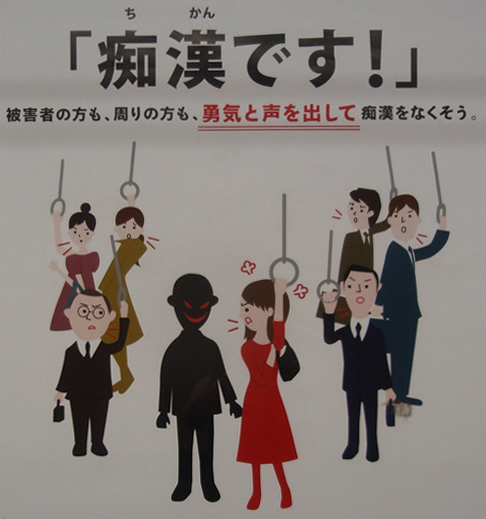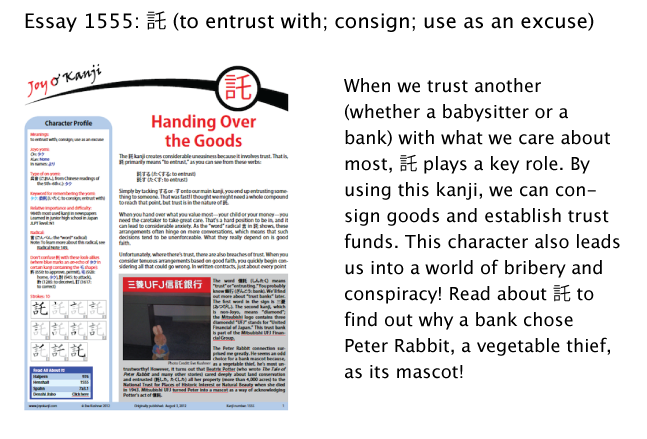In Praise of Kanji in the Shadows
Let's start with a quiz. Match the numbered words with the lettered definitions on the right. To help you out, I've supplied the usual meanings of the kanji in blue:
| 1. 辛抱 (spicy + to hug) | a. cloudy; irritating | |
| 2. 痴漢 (stupid + Chinese) | b. patience | |
| 3. 鬱陶しい (depression + pottery) | c. molester, pervert |
I'll block the answers with a photo of monkeys on Shodoshima:

Photo Credit: Eve Kushner
Okay, now for the answers, along with yomi. I've reddened any breakdowns that I've changed from above:
1.b. 辛抱 (しんぼう: hardship + to embrace) means "patience." When one faces difficulties, the only solution is to embrace the hardship!
2.c. 痴漢 (ちかん: infatuated + man) means "molester, pervert."
3.a. 鬱陶しい (うっとうしい: depression + happy) means "(1) gloomy (e.g., mood); depressing; (2) heavy (weather); cloudy; or (3) irritating; troublesome)." Note that I've added more definitions here.
In every case, the reddened meaning is the one you're least likely to learn. It's hard enough to remember that 辛 (1432) is "spicy" and can be read not only as から•い and sometimes つら•い but also as シン. On top of that, you might try to remember the stroke order and etymology of this kanji, as well as its function as a radical in characters such as 辞 (word, to resign). By that point, you're feeling overloaded, and some of the many meanings of this kanji, such as "bitter; dry taste; salty; severe; painful," keep slipping out of your brain. Incidentally, "hardship" didn't even make it onto that long list, though "severe" and "painful" point the way there.
In saying all this, I'm not trying to add to your sense of hardship! Far from it.
Rather, I mention this issue with a slight sense of indignation and woundedness! That is, as the second child in a family, I know what it is to be Hand-Me-Down Rose, as my mother called me. Kids who aren't the firstborn tend to inherit castoff clothes, used schoolbooks, and the remnants of their parents' attention! There are about a thousand photos of the first child and maybe two of the second!
Well, when it comes to kanji definitions, I can finally do something about this. I'm not afraid to stand up for the least-well-known meanings of a character! Last but not least! Overlooked but not forgotten!
Let's return to some of the examples above. If you knew 陶 only as "pottery," what would you think if you encountered this sentence:
毎日鬱陶しくていやですね。
Don't you just hate having this cloudy weather every day?
毎日 (まいにち: every day); いや (detestable; unpleasant)
You'd be baffled! The sentence would seem to suggest that depressing pottery proves to be unpleasant every day! In fact, 鬱陶しい changes its meanings as often as some of the sole kanji we've seen, and in this case the word means "heavy (weather); cloudy."
How about this one:
鬱陶しい奴だ!
You're a pain in the neck!
奴 (やつ: guy, with a derogatory nuance)
This would seem to be about a guy with a depressing pottery collection! Instead, we're seeing the third sense of 鬱陶しい: "irritating; troublesome."
People often write うっとうしい, rather than 鬱陶しい, so if you saw the hiragana rendering, maybe you wouldn't visualize pottery where there wasn't meant to be any. But if that were true, you'd miss out on the wonderful repetition of the 缶 component in the two kanji. (You might need to magnify the text to find the 缶 in 鬱!)
Now, what about 痴漢? I had heard about this word years ago from a young Japanese friend. Traumatized by a pervert on the train, she spoke about this issue quite a bit. However, I had no idea how the word was written until I saw this sign on my recent trip:

Photo Credit: Eve Kushner
Here's the second line:
被害者の方も、周りの方も、勇気と声を出して痴漢をなくそう。
Get rid of perverts! Victims and the people around them, call out loudly (when a pervert takes action)!
被害者 (ひがいしゃ: victim); 方* (かた: person); 周り (まわり: surrounding);
勇気 (ゆうき: courage, boldness); 声を出す (こえをだす: to speak, say, vocalize); なくす (無くす: to get rid of, shown here in the imperative voice)
What a surprise to see 漢, the first half of 漢字 (かんじ), in such a word! How can it be?
As Halpern says, the 漢 in 痴漢 means "man." The word 痴漢 is not alone in this sense. Here are some other examples:
巨漢 (きょかん: giant man)
大食漢 (たいしょくかん: big eater, glutton)
暴漢 (ぼうかん: ruffian)
門外漢 (もんがいかん: outsider, layman)
In fact, 漢 has a non-Joyo kun-yomi of おとこ, so it has a connection to "man" in that way, as well.
Let's consider one more example from an essay currently in the works:
斑なく仕事をする
to do one's job without mistakes or deficiencies
仕事 (しごと: work)
If you know 斑 as "spot," this sounds like "to do work without spots"! Actually, its meaning in 斑なく仕事をする comes from these words:
斑 (むら: unevenness; inconsistency; erraticness; irregularity)
斑なくor 斑無く(むらなく: evenly; equably; in an orderly, uniform fashion)
In a way, it's not hard to "connect the dots" here, figuring out how spots and unevenness would have a relationship. That is, if you're painting a wall, you likely want the color to be uniform with no spots missed. It should be spotless! A spot is a sign of irregularity.
However, if you were thinking of "spot" in the sense of a dalmatian and if someone then told you to work without "spots," you'd be stumped!

I've just published essay 1555 on 託, which primarily means "to entrust," as when you put something in someone else's care. But that's not all it means! Other definitions include "to consign," "small talk," "to transmit," and "to use as an excuse." Without excuses we'd be nowhere, so don't forget that one! Here's a preview:

Have a great weekend!

Comments